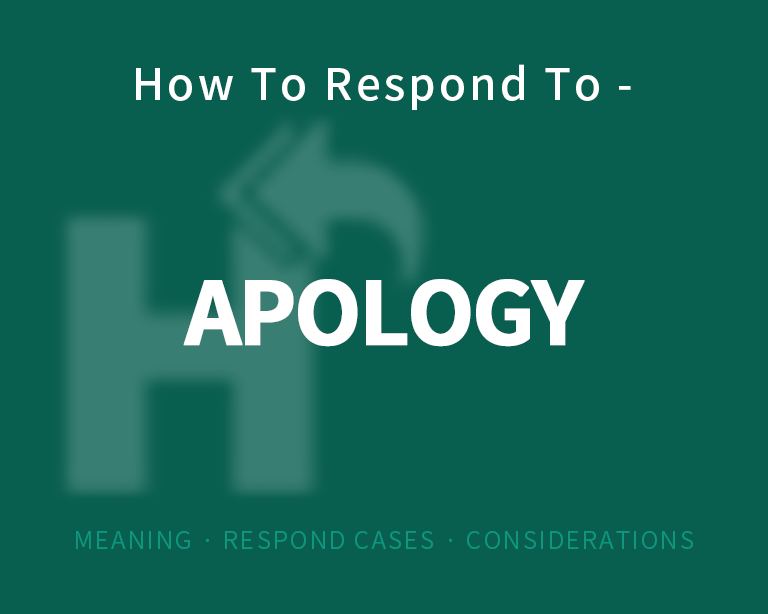The best way to respond to an apology

What does 'apology' mean?
An apology refers to an expression of regret for some offense, failure, mistake or wrongdoing. When someone apologizes to you, it means they recognize that their words or actions caused you harm or discomfort, and they wish to make amends. Apologies can be difficult to give as well as receive, so responding appropriately is important.
The 3 best ways to respond to an Apology
Accept the apology graciously. Say something like "Thank you for apologizing. I appreciate you taking responsibility for your actions." This diffuses tension and allows you both to move on constructively.
Express gratitude for the apology. For example, you can say "I appreciate you apologizing. That means a lot." This underscores the value you place on the relationship and the other person making things right.
Explain how their actions impacted you (if needed). If the situation warrants it, you might say "Thank you for apologizing. What you said/did hurt my feelings (or caused me stress, etc.)." But then reiterate your appreciation for the apology.
What are the considerations when responding to an Apology?
Some things to keep in mind:
Be sincere in accepting the apology. Do not say "It's fine" if you are still angry or hurt. But try to be open to reconciling.
Avoid accusations and rehashing what happened. The goal is to move forward in a positive way.
Discuss how to prevent future issues (if needed). You might say "Thank you again for apologizing. How can we avoid issues like this going forward?" This can open an important dialogue.
Accept that everyone makes mistakes. Judging the other person will only make the situation worse. Look for the good in the apology and the opportunity to improve the relationship.
Forgive whenever you can. Forgiveness is a gift you give yourself. Try to forgive even if you can't forget.
Give the relationship a chance to heal. Rebuilding trust will take time. Have patience with yourself and the other person.
Specific examples of responding to an Apology
Case 1: A friend apologizes for cancelling plans at the last minute. You say: "I appreciate you apologizing. I was disappointed but I understand things come up. Let's reschedule soon."
Case 2: A coworker apologizes for raising their voice in a meeting. You say: "Thank you, I accept your apology. We all get frustrated at times. Let's make sure we communicate better going forward."
Case 3: A family member apologizes for saying something hurtful. You say: "Thank you for apologizing. Your words were painful but I appreciate you taking responsibility. We all have more to learn when it comes to communicating with compassion."
These responses aim to build understanding and improve the relationship through openness to forgiving and reconciling. The specific wording may differ but the intent is to move forward in a constructive spirit.
Summary
When someone apologizes, choose your response wisely. A good apology aims to clear the air and bring people back to the shared value of the relationship. Your willingness to accept the apology sincerely, graciously and wholly is the first step to overcoming issues and rebuilding trust. Look for the learning and growth in mistakes instead of casting blame. With time and effort, even serious harms can be repaired. Meet others where they are with empathy, compassion and an open heart.